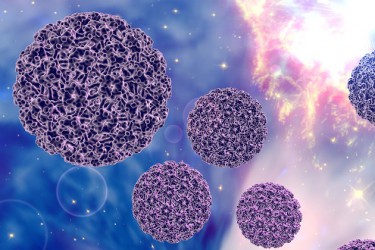
Vaccine against cervical cancer is being tested in mice successfully
According to health experts, around 4,500 women in Germany fall ill each year from cervical cancer. Now researchers have developed a therapeutic vaccine to combat the Human papilloma virus (HPV) – induced cancer. In animals, this is managed already.
One of the most common cancers in women
Cervical cancer is the third most common cancer in women, worldwide the German cancer research center (DKFZ) reported in a current message. In Germany alone, approximately valued at 4,540 women suffer from it, according to the German cancer society on your Portal. Scientists from the DKFZ have developed a therapeutic vaccine to combat the Human papilloma virus (HPV) – induced cancer. In mice, this is managed already. The goal is to develop a vaccine for people who are already ill, and therefore not of a vaccination benefit.

Human Papilloma Virus
Cervical cancer is mostly caused by Human papilloma virus (HPV) that infect the mucous membrane cells and uncontrollably proliferate.
Infection with HPV can lead to anal cancer and cancer of the mouth and throat.
To protect against the cancer-causing viruses vaccines available to prevent infection.
However, this HPV vaccination is not effective for people who have already come in contact with the Virus.
In addition, the HPV-vaccination coverage is low.
The Standing Committee on vaccination (STIKO) recommends HPV vaccination for girls for years, – meanwhile, for boys – however, in Germany less than half of the 17 vaccinated-year-old girls against HPV.
A therapeutic vaccine for the treatment of cancer patients
“Our goal is to develop a therapeutic vaccine, with the people can be treated, which have already been precursors to HPV infection and may also have a HPV-related cancer or cancer,” said Angelika Riemer from the DKFZ.
“A therapeutic vaccine stimulates the immune system, so that it is directed against infected or abnormal cells and kills them.”
The information, according to one of the main differences between preventive vaccination and therapeutic vaccination is in the time of the vaccination: the Former only works if given before infection.
With a therapeutic vaccination already existing infections and their consequences can be treated.
Another difference between preventive vaccination and therapeutic vaccination shows the response of the immune system After a vaccination, the body’s antibodies, which protect him / her against future infection with the respective pathogens.
A therapeutic vaccination the other hand, cytotoxic T-cells. These immune cells are able to detect tiny molecular structures of the papilloma virus, so-called epitopes, on the surface of infected cells or cancer cells and kill this suspect identified cells.
In half of the vaccinated animals, the tumors completely disappeared
Riemer and her colleagues were able to show in mice, that her experimental works diseases, a therapeutic vaccine against HPV-related cancer.
They published their results in the journal “OncoImmunology”.
“In half of the vaccinated mice, the tumors completely disappeared,” said the DKFZ researcher.
As it says in the message that contains the vaccine as the most important part of the Epitope, the HPV-induced Tumor carries on its surface.
These protein structures are transported to the vaccination in the lymph nodes. “This is particularly efficient to trigger an immune response, because there the cells are all immune for a defensive response is required,” explained Riemer.
Crucial in the cytotoxic T-cells are in this case. They come with the Epitopes of the vaccine in contact, this is for you, the Signal, the rest of the body to sweep to the cells which carry these recognition molecules.
You will find on cancer cells, which carry these HPV-epitopes on the surface, kill the cytotoxic T-cells.
Effectiveness still needs to be better
Currently, the therapeutic vaccine against cervical cancer and other HPV-related cancers in the preclinical development phase. To be able to him in the future for people to use, it is necessary to overcome some hurdles.
“The effectiveness of vaccination needs to be better,” said Riemer.
From the development of therapeutic vaccines against other diseases is well known that vaccination works sometimes better if you includes various detection molecules.
“In our first experiment, on mice, it was Vice versa,” says Riemer. Possibly, in HPV-tumors, and only one, to use but a really good detection molecule. The can, however, only further investigations.“ (ad)